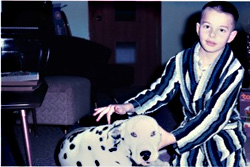Every year, Richard Hugo House stages an “Inquiry”—a weekend-long exploration of some literary theme. This year, the writing center is shifting focus from simply presenting new work to actively commissioning it, a change spearheaded by Executive Director Lyall Bush. Among the classes and panel discussions in “Telling Childhood” this Friday and Saturday, authors like Deb Caletti, Charles D’Ambrosio, David Rakoff, and others will be on hand to read new work written especially for the occasion.
“Instead of making it a festival in which people show up and talk, why not give people money and have them produce new work on the theme?” asks Bush, in his post since May. “I think that’s why I was hired—because I want [Hugo House] to be known as a place where fresh writing gets made and gets heard.”
Childhood was always going to be the central idea of this year’s program, but it took a while to find just the right gerund to accompany it. After considering “Reclaiming” or “Re-examining,” it was decided “Telling” would offer the most fertile ground for stories—in particular, a place to explore the realm between memory and fiction. “There’s a kind of implicit re-Telling Childhood in that,” Bush says.
“I thought, let’s not go the Spielberg route of assuming that children are wiser or closer to God, or closer to nature, and let’s not necessarily go the Nabokovian route—there’s a whole lot of gray area in there. . . . A lot of what we see in childhood comes from the Romantics, from the Wordsworthian idea that we come into the world trailing clouds of divine glory that fade, and somehow adulthood is a lost childhood, it’s an expulsion from Eden. So I just wanted to put that in front of writers and say, ‘Go.’ Maybe Wordsworth was right, and maybe Spielberg is right; or maybe the idea is that we don’t know anything about childhood.”
“[Inaugural Hugo House writer in residence] Rebecca Brown and I were talking about the fact that it’s hard to remember chunks of childhood—you remember flashes, like lightning storms: If you had a traumatized childhood, there might be some bright flash about your father’s anger, or some other bright flash about your aunt taking you for ice cream. But it’s hard to feel that you know what is true. . . . So she’s doing this whole thing on inventing her childhood, and then not knowing to what extent she knows the difference.”
One way of looking at childhood, in a sort of subtheme to the weekend, is through pop music. Critic Ann Powers will head a panel discussion on the topic of self-definition through music—the ways our record collections and iPod playlists made/make us who we are. And writer Greil Marcus was invited not just because Bush deeply admires his work, but because his recent book The Old, Weird America: The World of Bob Dylan’s Basement Tapes seemed to Bush to draw an illuminating connection between music and childhood. In 1967, in what came to be known as his Basement Tapes, the singer revisited some of the dark folk songs he remembered from his youth. Bush found Marcus’ exegesis on Dylan’s backward glance inspiring: “This is great—this is about childhood obsessions, complex adult themes. . . . I am never more childlike than when I get interested in new music, or new writers. My current thing is Wilco, and I cannot seem to listen to them enough—it’s very much like when I was 11 years old.” Thus Marcus was invited to contribute; he’ll read his new piece, “Obsessive Memories,” on Friday night.
And if you can’t make it this weekend, most of the new work will be available online by the end of the month. Hugo House’s Web site, in its own childhood, is currently being redesigned; says Bush, “I think 90 percent of the contracts we have for “Telling Childhood” include a [new] clause for digital rights for the first year.”
Telling Childhood Richard Hugo House, 1634 11th Ave., 206-322-7030; see www.hugohouse.org for complete schedule. $8–$25; weekend pass $45–$60. Fri., Oct. 13–Sat., Oct. 14.







